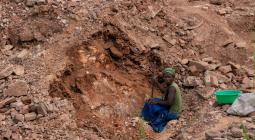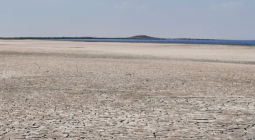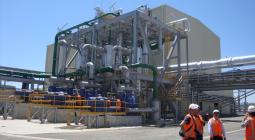Blinded, sexually assaulted, silenced: the war over lithium, Argentina’s ‘white gold’
In the country’s ‘lithium triangle’ activists say Indigenous land protections have been removed and protests against mining violently repressed
The first time, they came at 2am and without a warrant. Rosa* was alone. She was gagged, her eyes covered, and her hands bound with a cable tie.
“I was paralysed. I felt someone choking me,” Rosa recalls. “They called me a socialist, a whore. I was in my underwear; they touched me. One put his fingers inside of me.”
It was the night after widespread protests against sweeping changes to the constitution in Jujuy, a northern Argentine province. The reforms were approved in the early hours behind closed doors, affecting two articles: one limiting the right to demonstrate and the other modifying the right to Indigenous lands, with the undeclared aim of facilitating lithium mining.
“The officers [two women and a man] told me not to protest any more,” says Rosa, a 42-year-old teacher and political activist. “When they left, they took the gag out and, one by one, kissed me on the lips. I stayed immobilised on the floor for 13 hours.”
Jujuy sits in the “lithium triangle”, a stretch of the Andes and salt flats of Argentina, Chile and Bolivia containing most of the world’s lithium reserves. Argentina holds the second-largest deposits of the metal in the world and has 38 mining projects planned in the north of the country, with three already operating. Its lithium exports grew by 235% in 2022, while the country’s new president, Javier Milei, has pledged to develop the sector.
The constitutional reforms passed in June 2023 without the informed consent of the public – according to human rights organisations – including its sizeable Indigenous population, a right enshrined in law since 2000. The amendments come amid increasing global demand for lithium, the “white gold” crucial for electric car batteries, laptops and mobile phones.
The Guardian collected testimonies from 22 people, reviewed video evidence, and interviewed human rights experts, lawyers and local journalists about alleged police repression in the weeks following the reforms – a threat which, according to activists, persists to this day.
Many accounts point to the provincial police using indiscriminate force against protesters and committing a campaign of intimidation and surveillance. Several people were blinded, some reportedly denied medical care, and others alleged that plainclothes officials assaulted demonstrators. Today, many report being watched.
Numerous Indigenous communities do not hold property titles to their lands in Jujuy but have the right to their ancestral territories under Argentina’s 1994 constitution. Humahuaca, a dusty, pastel-hued town sitting in a valley alongside traces of the Inca empire, is one of the domains where protests erupted on the night of 1 July.
Joel Paredes is a 28-year-old ceramist. His father owns land rich in minerals – such as iron oxide and copper oxide – and he was worried about the government’s “land grab”. “I wanted to fight for my rights, for the many losing their lands,” he says. At midnight, as people sang peacefully, the police began shouting and then shooting. “We had to run, but we became blocked,” he recalls.
Video footage from before the police actions shows families with banners and Argentine flags, with officers watching on in riot gear. “Mothers were screaming. I was all bloody. A rubber bullet hit my right eye and I felt as if I had a needle sticking to the back of my head. I knew then I was blind,” Paredes says.
At the hospital, medics protected him from police. “The police came asking for me by name. They wanted to keep us quiet,” he says. We are afraid to go outside. The streets are empty. The children do not play Lucía Apaza, community leader
In San Salvador, the region’s most populous city, a similar protest occurred on 20 June. Hundreds chanted: “No to lithium, yes to water and life.” Journalist Cesar Angulo, 39, describes a peaceful protest turned violent by police. “People were singing and dancing – the protest was peaceful. Then, the police started attacking … It was terrible to watch,” he says.
Video recordings analysed by Amnesty International revealed police firing rubber bullets at demonstrators’ heads, which is prohibited for the federal police and the gendarmería in Argentina but not for state police forces.
Ernesto Jorge Aguirre, 52, a painter, was injured running towards the city’s congressional building. “The police shot a teargas cylinder at my face. It was like a bomb.” Aguirre’s nose broke, and his left eye was blinded. “There was a lot of blood, and the ambulances wouldn’t come,” he says. “For me, that day, I lost my life.”
In Purmamarca, a town near the stunning Cerro de los Siete Colores, Mariela Gutierrez, 30, stood at a roadblock with her baby. Photos from the barricades show protesters and the police throwing objects, with injuries recorded on both sides. “I was hit while holding my baby,” she says. “Since then, I’ve had to hide; the police have been looking for me.”
The struggle has continued throughout Jujuy, albeit on a lesser scale. Amnesty International says people have been criminalised for participating in the demonstrations and now fear taking part in further protests. Many are also worried about being added to the local authority’s blacklist.
On the main road outside Purmamarca, an encampment has been set up, mainly by elderly Indigenous protesters. Police are stationed opposite and record those coming and going.
An 80-year-old woman who wishes to be known only as la abuela – the grandmother – for fear of reprisals, has witnessed police violence and received threats. Now, she visits the yellow and blue tarpaulin tent every day. “The police come every day as well,” she says. “Sometimes, they enter the camp and film us.”
Gutierrez, who lives in the Salinas Grandes Basin, an area rich in lithium, takes part in the protests as she is concerned about the impact of mining on the environment. “Lithium is bad for our water. We have lithium, and we do not want our water contaminated,” she says.
Lithium extraction needs about 2m litres of water for each tonne, and as Argentina’s salt flats are found in arid territories, there are concerns about depleting sources.
For three months, Gutierrez camped in front of the presidential palace in the capital, Buenos Aires; her son took his first steps there. “Some Argentines discriminated against us. They called us Bolivians and told us to go back to our own country,” she says.
Six months on, communities are still being shattered. “We are afraid to go outside. The streets are empty. The children do not play,” says 71-year-old Lucía Apaza, the president of the mountainous community of Caspalá.
In Tilcara, a woman shelters from the heat and chisels the blue paint-off concrete blocks that once formed her bedroom. “This was my house for 10 years. They knocked it down last week,” says Veronika*, a mother of three. She says the police visited her house three days before it was destroyed, forcing her to sign an agreement without any mention that her house would be demolished.
“The police told me that if I didn’t sign, they would take my children away and I would be arrested. It was a trap,” she says. “I was inside with my children. We couldn’t do anything. There was no mercy.”
The land will not be mined for lithium but is understood to be making way for a new shopping centre for tourists. “They could do it because of the constitution. Now, nothing can be done. We have lost all of our rights,” she says.
Human rights groups widely condemn the repression of the protests. Jan Jarab, the UN human rights representative for South America, says they identified “excessive use of force by law enforcement authorities” and that the reforms “contravene Argentina’s international human rights obligations”.
Argentina’s former human rights secretary Horacio Pietragalla also weighed in on the debate, filing a petition with the country’s supreme court and requesting an end to the repression.
Mariana Fontoura Marques, an investigator at Amnesty International, says the local communities are facing a complete lack of rights to defend themselves. “The only way these people have to speak out is by going to the streets as they are not represented in parliament or government,” she says.
The Jujuy local authority has denied allegations of police repression, while then-governor Gerardo Morales called the reforms “progressive”. The state did not respond to a request for comment.
Silvana Yañez is one of four lawyers continuing to fight for the rights of the local people. “The government wants to disappear the community, to take the land, because of the water, lithium, minerals,” she says. “They have made the people scared. Their voices have been silenced.”
She believes the race to mine lithium has blinded the international community. “The government doesn’t care about the community or the Indigenous people because they are in the business of making money with China and the United States,” Yañez says. “We don’t have international help because everyone wants to sell the lithium.”
Rosa says officers visited her once more after continuing to protest. She shows photos of the aftermath, of her belongings smashed on the floor, and says she was ordered to stop talking to the press. “I say to them, no,” she says. “But I feel we will never get justice in Jujuy.”
Cover photo: A man carries the Wiphala flag – which represents the native peoples of the Andes – at the protest camp in Purmamarca, Jujuy province. The demonstrators, many of them from the Indigenous community, are angry about changes made to the state constitution, and the growth of mining. Photograph: John Owens






